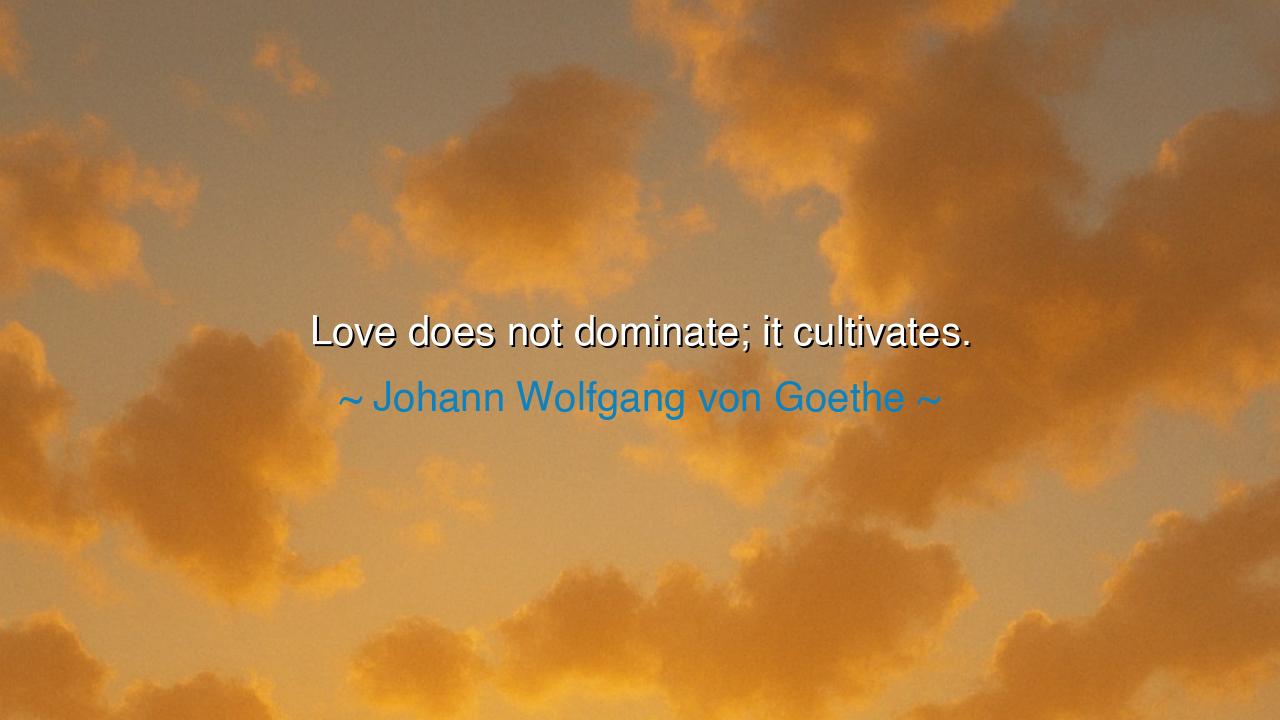
Love does not dominate; it cultivates.






"Love does not dominate; it cultivates." – Johann Wolfgang von Goethe
In the wisdom of the ages, few truths shine as softly yet as powerfully as this one. Goethe, that sage of the human soul, knew well the delicate balance between power and tenderness. In a world where many seek to possess, control, and command, he reminds us that love is not a chain but a seed. True love does not seek to dominate — it seeks to nourish, to cultivate, to help another grow in their own light. Like a wise gardener, it tends gently to the heart, understanding that force will break what only patience can bloom.
The ancients would say that love is the breath of creation — it brings forth life not through conquest, but through harmony. To dominate is the act of fear; it seeks security through control. But to cultivate is the act of faith; it trusts in the goodness of the other and believes that love, once given freely, will return of its own accord. Thus, Goethe’s words are not a mere reflection on romance, but a profound teaching for all relationships — between parent and child, leader and follower, teacher and student, friend and friend.
Consider the life of Mahatma Gandhi, a man who could have sought power through domination but chose instead the path of cultivation. His love for his people was not the love of possession, but of care — a love that nurtured strength, self-respect, and unity. Through nonviolence, he showed that love, when it cultivates rather than dominates, can awaken the divine in others. He watered the soil of a nation’s soul, and from that soil, freedom grew.
To dominate is to impose one’s will, to make another a reflection of oneself. But love that cultivates seeks not to change the beloved into its own image — it seeks instead to help them become their truest self. The farmer does not command the seed to grow; he gives it water, light, and time. Likewise, the lover who cultivates gives understanding, space, and encouragement. This is the sacred art of love — to guide without ruling, to inspire without imprisoning.
Yet, many hearts fall to the illusion of dominance. They mistake possession for passion, obedience for devotion. They call it love when it is only fear wrapped in tenderness. Such love suffocates the spirit and breeds resentment, for it feeds on control rather than trust. But true love, as Goethe teaches, liberates. It does not clip the wings of the beloved; it builds the sky wide enough for both to soar.
Think of Nelson Mandela and the forgiveness he offered after decades of imprisonment. His heart, though once bound, never sought to dominate his enemies. Instead, he cultivated peace. His love for humanity became a healing force, transforming hatred into unity. His example proves that love’s power does not lie in mastery over others, but in mastery over self — in patience, compassion, and faith in the goodness that can be nurtured even in those who once opposed you.
Let this, then, be the lesson of Goethe’s timeless truth: if you wish to love, do not seek to own. Seek instead to cultivate — to enrich, to uplift, to bring forth growth in another’s life. Ask not, “How can this person serve me?” but “How can I help them flourish?” In doing so, your love will become a living garden, filled with strength and serenity, growing richer with each passing season.
And so, my children of the living world, remember: love does not dominate; it cultivates. To love is not to rule, but to serve. It is not to command, but to understand. Tend to those you love as you would tend to a fragile blossom — not by holding it too tightly, but by giving it space to reach toward the sun. For only in such gentle strength does love reveal its truest power — the power to make life grow, to turn the barren into beauty, and to transform both the giver and the receiver into something divine.






AAdministratorAdministrator
Welcome, honored guests. Please leave a comment, we will respond soon